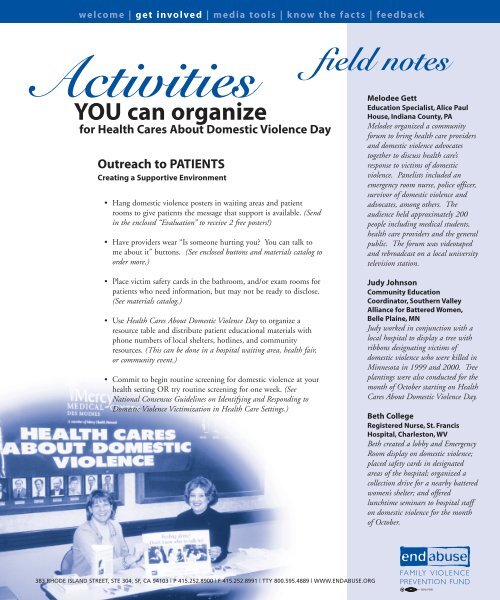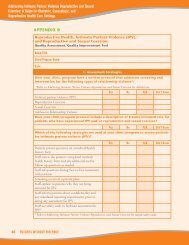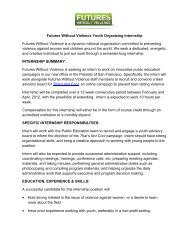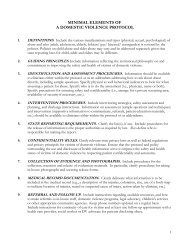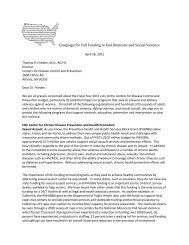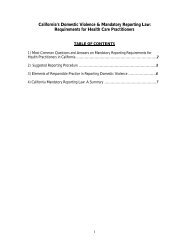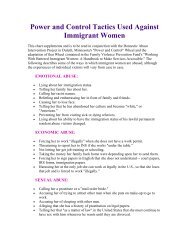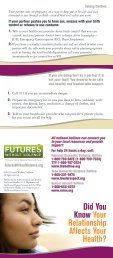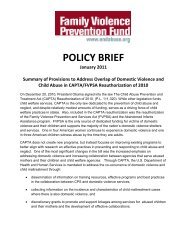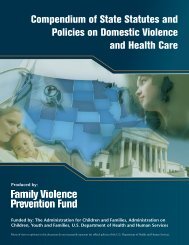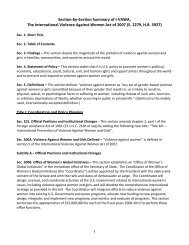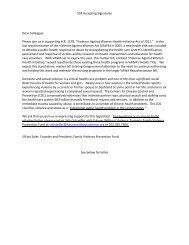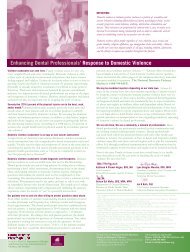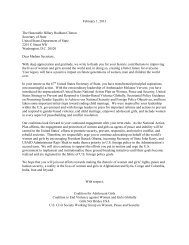Get Involved - Futures Without Violence
Get Involved - Futures Without Violence
Get Involved - Futures Without Violence
Create successful ePaper yourself
Turn your PDF publications into a flip-book with our unique Google optimized e-Paper software.
welcome | get involved | media tools | know the facts | feedback<br />
Activities<br />
YOU can organize<br />
for Health Cares About Domestic <strong>Violence</strong> Day<br />
Outreach to PATIENTS<br />
Creating a Supportive Environment<br />
• Hang domestic violence posters in waiting areas and patient<br />
rooms to give patients the message that support is available. (Send<br />
in the enclosed “Evaluation” to receive 2 free posters!)<br />
• Have providers wear “Is someone hurting you? You can talk to<br />
me about it” buttons. (See enclosed buttons and materials catalog to<br />
order more.)<br />
• Place victim safety cards in the bathroom, and/or exam rooms for<br />
patients who need information, but may not be ready to disclose.<br />
(See materials catalog.)<br />
• Use Health Cares About Domestic <strong>Violence</strong> Day to organize a<br />
resource table and distribute patient educational materials with<br />
phone numbers of local shelters, hotlines, and community<br />
resources. (This can be done in a hospital waiting area, health fair,<br />
or community event.)<br />
• Commit to begin routine screening for domestic violence at your<br />
health setting OR try routine screening for one week. (See<br />
National Consensus Guidelines on Identifying and Responding to<br />
Domestic <strong>Violence</strong> Victimization in Health Care Settings.)<br />
383 RHODE ISLAND STREET, STE 304, SF, CA 94103 | P 415.252.8900 | F 415.252.8991 | TTY 800.595.4889 | WWW.ENDABUSE.ORG<br />
field notes<br />
Melodee <strong>Get</strong>t<br />
Education Specialist, Alice Paul<br />
House, Indiana County, PA<br />
Melodee organized a community<br />
forum to bring health care providers<br />
and domestic violence advocates<br />
together to discuss health care’s<br />
response to victims of domestic<br />
violence. Panelists included an<br />
emergency room nurse, police officer,<br />
survivor of domestic violence and<br />
advocates, among others. The<br />
audience held approximately 200<br />
people including medical students,<br />
health care providers and the general<br />
public. The forum was videotaped<br />
and rebroadcast on a local university<br />
television station.<br />
Judy Johnson<br />
Community Education<br />
Coordinator, Southern Valley<br />
Alliance for Battered Women,<br />
Belle Plaine, MN<br />
Judy worked in conjunction with a<br />
local hospital to display a tree with<br />
ribbons designating victims of<br />
domestic violence who were killed in<br />
Minnesota in 1999 and 2000. Tree<br />
plantings were also conducted for the<br />
month of October starting on Health<br />
Cares About Domestic <strong>Violence</strong> Day.<br />
Beth College<br />
Registered Nurse, St. Francis<br />
Hospital, Charleston, WV<br />
Beth created a lobby and Emergency<br />
Room display on domestic violence;<br />
placed safety cards in designated<br />
areas of the hospital; organized a<br />
collection drive for a nearby battered<br />
women’s shelter; and offered<br />
lunchtime seminars to hospital staff<br />
on domestic violence for the month<br />
of October.
field notes<br />
Pat McGill<br />
Vice President Legislative Policy,<br />
West Virginia Hospital<br />
Association, Charleston, WV<br />
The West Virginia Hospital<br />
Association (WVHA) hosted a press<br />
conference at their office in<br />
Charleston, WV where they<br />
announced the WVHA’s support<br />
for the Governor’s Family <strong>Violence</strong><br />
Coordinating Council recommendations<br />
regarding health care’s response<br />
to domestic violence. The attendees<br />
included the Secretary of Health and<br />
the Deputy Insurance Commissioner,<br />
among others. Two television<br />
stations and the Charleston<br />
newspaper covered the event.<br />
Joanne Armstrong, MD<br />
Women’s Health Medical Director,<br />
Aetna, Inc., Houston, TX<br />
Aetna posted information on Health<br />
Cares About Domestic <strong>Violence</strong> Day<br />
on Aetna’s website, which reaches<br />
over 35,000 employees. Domestic<br />
violence educational and referral<br />
information was also included in<br />
Aetna’s printed and telephonic<br />
pregnancy materials, which were<br />
distributed to approximately<br />
160,000 pregnant women enrolled<br />
annually in their maternity<br />
management program, L’il<br />
Appleseed’. Additionally, Aetna chose<br />
to feature an article on domestic<br />
violence in their October newsletter.<br />
Belinda Robinson, CAC<br />
Mental Health Counselor, Greater<br />
S.E. Hospital, Wash., DC<br />
Belinda presented a workshop to<br />
her community on preventing, and<br />
recognizing domestic violence and<br />
how to offer victims support.<br />
Activities<br />
Outreach to STAFF<br />
<strong>Get</strong>ting Your Co-Workers <strong>Involved</strong><br />
• Introduce the subject of domestic violence by sending an<br />
e-mail to staff about the day. (See e-mail script.)<br />
• Post information on health facility/community website<br />
about the day. (See website script.)<br />
• Invite a domestic violence advocate, or survivor to speak at<br />
a brown bag lunch.<br />
• Photocopy sections of the enclosed National Consensus<br />
Guidelines on Identifying and Responding to Domestic<br />
<strong>Violence</strong> Victimization in Health Care Settings and distribute<br />
by specialty OR encourage health care employees to<br />
call (888) Rx-ABUSE, TTY: (800) 595-4889 for more<br />
information.<br />
• Create, or amend a domestic violence protocol for your<br />
health care setting.<br />
• Organize a training for health care staff on domestic<br />
violence intervention and assessment. (See health materials<br />
catalog.)
Activities<br />
Outreach to the COMMUNITY<br />
<strong>Get</strong>ting the Word Out<br />
• Write an article in your facility newsletter. (See newsletter<br />
script.)<br />
• Reach out to your community by writing an op. ed., or<br />
editorial memo for the local newspaper on Health Cares<br />
About Domestic <strong>Violence</strong> Day. (See op-ed script.)<br />
• Collaborate with a local domestic violence agency to<br />
hold a community forum on domestic violence at the<br />
health center.<br />
• Let patients and the community know that your health<br />
care facility, health association, or of health cares about<br />
domestic violence victims by holding a press conference<br />
to launch a program on routine screening for domestic<br />
violence. (See news release script.)<br />
• Distribute purple ribbons to the community and help<br />
raise awareness that October is Domestic <strong>Violence</strong><br />
Awareness Month.<br />
• Write a letter to your representative encouraging them<br />
to support H.R. 1267. (See sample letter.)<br />
Vivian Hanson, MD<br />
Bremerton-Kitsap Health<br />
Department, Seattle, WA<br />
Vivian hung posters in the hospital’s<br />
waiting areas and women’s bathrooms.<br />
Additionally, nurse practitioners<br />
and physician assistants wore<br />
provider buttons.<br />
Binnie Lehew<br />
Iowa Department of Public<br />
Health, Des Moines, IA<br />
Binnie conducted outreach to Iowa<br />
hospitals, WIC, MCH, and family<br />
planning centers with the Clinical<br />
Guidelines on Routine Screening for<br />
Domestic <strong>Violence</strong>. She also conducted<br />
a follow-up mailing to distribute<br />
20,000 General English patient<br />
safety cards, 2,000 General Spanish<br />
safety cards, practitioner reference<br />
cards, and posters purchased by the<br />
Iowa Medical Society Alliance. She<br />
worked closely with five central Iowa<br />
hospitals to organize HCADV Day<br />
events; each purchased a banner that<br />
included their hospital logo and the<br />
phrase “Health Cares about<br />
Domestic <strong>Violence</strong>” to advertise their<br />
involvement.<br />
Penny Randall<br />
United Behavioral Health Plan of<br />
California (UBH), San Diego, CA<br />
and Marianne Balin, Blue Shield of<br />
California, San Francisco, CA<br />
In a joint effort, UBH and Blue<br />
Shield of California offered their<br />
member providers a free CME course<br />
on domestic violence for the month<br />
of October. They also included an<br />
article in their newsletters on<br />
HCADV Day.<br />
field notes
field notes to help YOU plan<br />
The More Help the Better<br />
Marcia Smith<br />
Executive Director, Oklahoma<br />
Coalition Against Domestic<br />
<strong>Violence</strong> and Sexual Assault,<br />
For more information on Health Cares About Domestic <strong>Violence</strong> Day, visit the<br />
Family <strong>Violence</strong> Prevention Fund’s website www.endabuse.org/hcadvd:<br />
Oklahoma City, OK<br />
Marcia sent the “Dear Provider”<br />
• to order posters and safety cards and other clinical tools<br />
cards to all coalition member<br />
physicians to encourage routine<br />
• to get information on state domestic violence and health care reporting requirements<br />
screening for domestic violence and<br />
sent an additional 250 cards to<br />
providers across Oklahoma.<br />
• to view the PDF version of the National Consensus Guidelines on Identifying and<br />
Responding to Domestic <strong>Violence</strong> Victimization in Health Care Settings<br />
Resources<br />
Nancy Himes, RN<br />
Family <strong>Violence</strong> Nurse Liaison,<br />
Sinai Hospital of Baltimore,<br />
Baltimore, MD<br />
Nancy conducted ground rounds<br />
at the hospital; distributed<br />
purple ribbons to hospital staff<br />
designating Domestic <strong>Violence</strong><br />
Awareness Month; created a<br />
domestic violence bulletin board<br />
display; and included a note on<br />
the issue in employee pay stubs.<br />
Lorraine Beaver<br />
Advocate, Abused Women’s Aid in<br />
Crisis (AWAIC), Anchorage, AK<br />
Lorraine held an informational<br />
booth with volunteers from many<br />
different hospital departments,<br />
involving speakers, singers,<br />
the clothesline project and t-shirt<br />
making for victims and survivors of<br />
domestic violence. She held a<br />
domestic violence training the<br />
following day for providers.<br />
Melissa Minor<br />
Medical Student, Stanford School<br />
of Medicine, Palo Alto, CA<br />
Melissa distributed practitioner<br />
reference cards, articles and fact<br />
sheets in all student mail boxes.<br />
She also hung informational<br />
posters in the medical school.<br />
The National Health Resource Center on Domestic <strong>Violence</strong> provides free technical<br />
assistance and materials through their toll-free line:<br />
(888) Rx-ABUSE, TTY: 1-800-595-4889<br />
and web: www.endabuse.org/health<br />
Call this number for assistance with your Health Cares About Domestic <strong>Violence</strong><br />
Day planning.<br />
As part of the National Health Initiative on Domestic <strong>Violence</strong>, a free semimonthly<br />
listserv (electronic newsletter,) is used to continue the national dialogue<br />
on health care policy and domestic violence. To subscribe to our Family <strong>Violence</strong><br />
Prevention Fund Health eNews, visit www.endabuse.org or check the subscription<br />
box on the enclosed evaluation.<br />
The National Hotline on Domestic <strong>Violence</strong> provides free bi-lingual<br />
counseling and referral for victims of domestic violence (24 hours a day):<br />
(800) 799-SAFE, TTY: (800) 787-3224


